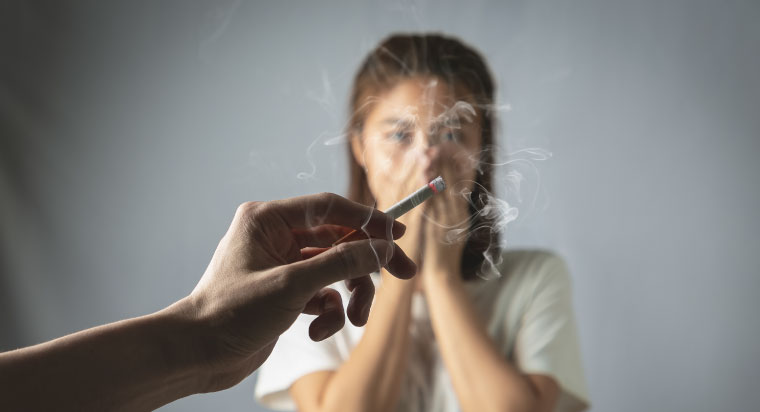While most people understand the dangers of smoking, many underestimate the harm caused by secondhand smoke. This invisible threat, composed of a toxic mix of over 7,000 chemicals, exposes even non-smokers to serious health risks, particularly affecting the lungs.
Let’s explore what secondhand smoke is all about and the lung diseases associated with it. We will also explain how and why protecting yourself is crucial. Please, read on!
What is Secondhand Smoke?
Secondhand smoke, also known as environmental tobacco smoke (ETS) or passive smoking, isn’t just an unpleasant odor. So, what is secondhand smoke?
It’s a mix of harmful chemicals, including tar, nicotine, and carbon monoxide, released from burning tobacco products like cigarettes, cigars, pipes, and even hookahs. A seemingly brief exposure to secondhand smoke can be harmful, posing similar damage inflicted on smokers themselves. These chemicals irritate and damage lung tissue, increasing the risk of serious health problems like lung cancer, heart disease, and chronic obstructive pulmonary disease (COPD).
Unfortunately, secondhand smoke doesn’t confine itself to the smoker’s immediate vicinity. It lingers in the air long after the initial source is gone, clinging to clothes, furniture, and even hair. This means you can encounter it in various ways:
- Direct exposure: Being near someone smoking, whether indoors or outdoors.
- Shared spaces: Inhaling secondhand smoke lingering in public areas like
restaurants, bars, or workplaces where smoking is allowed. - Secondhand exposure: Breathing in smoke particles attached to clothes, hair, or furniture of someone who has recently smoked.
- Unintentional exposure: Living with a smoker, even if they smoke outside, can expose you to secondhand smoke through ventilation systems or lingering particles.
What are the effects of Secondhand Smoke?
Inhaling secondhand smoke exposes your lungs to the same harmful chemicals as a smoker. These toxins damage lung tissue, increasing the risk of various lung diseases including:
- Lung cancer: Secondhand smoke is a leading cause of lung cancer in non-smokers, claiming thousands of lives every year. Even brief exposure can contribute to this risk.
- Chronic obstructive pulmonary disease (COPD): This group of lung diseases, including emphysema and chronic bronchitis, can cause difficulty breathing, wheezing, and coughing. Secondhand smoke exposure significantly increases the risk of developing COPD.
- Asthma: Exposure to secondhand smoke can trigger asthma attacks and worsen symptoms in individuals with pre-existing asthma. Children exposed to secondhand smoke are also more likely to develop asthma later in life.
- Pneumonia: Infants and young children are particularly vulnerable to pneumonia, a lung infection when exposed to secondhand smoke. This can lead to serious complications.
The harmful effects of secondhand smoke extend beyond the lungs, increasing the risk of heart disease, stroke, and even certain cancers. Additionally, pregnant women exposed to secondhand smoke are at higher risk of delivering low birth weight babies, increasing the infant’s risk of future health problems.
Protecting Yourself and Your Loved Ones
- While secondhand smoke might seem pervasive, you have the power to build your defenses and minimize exposure. Here are some practical steps you can take:
- Advocate for smoke-free policies in your workplace, home, and public spaces. Speak up, raise awareness, and encourage smoke-free environments wherever possible.
- When encountering secondhand smoke, politely ask smokers to step outside or move downwind. Open windows and doors for ventilation, and consider using air purifiers, especially in your home or office.
- Learn about the dangers of secondhand smoke and share reliable information with others. This way, you are empowering yourself and your loved ones to make informed choices.
- Encourage loved ones to quit smoking and offer support and resources to smokers willing to quit.
At Pulmonary Clinic of the Carolinas, we’re committed to promoting lung health and raising awareness about the dangers of secondhand smoke. We offer comprehensive lung screenings, diagnosis, and treatment for various lung diseases. If you have concerns about secondhand smoke exposure or its impact on your lungs, don’t hesitate to contact us. Together, we can breathe easier and create a healthier future for everyone.



 Translate
Translate

